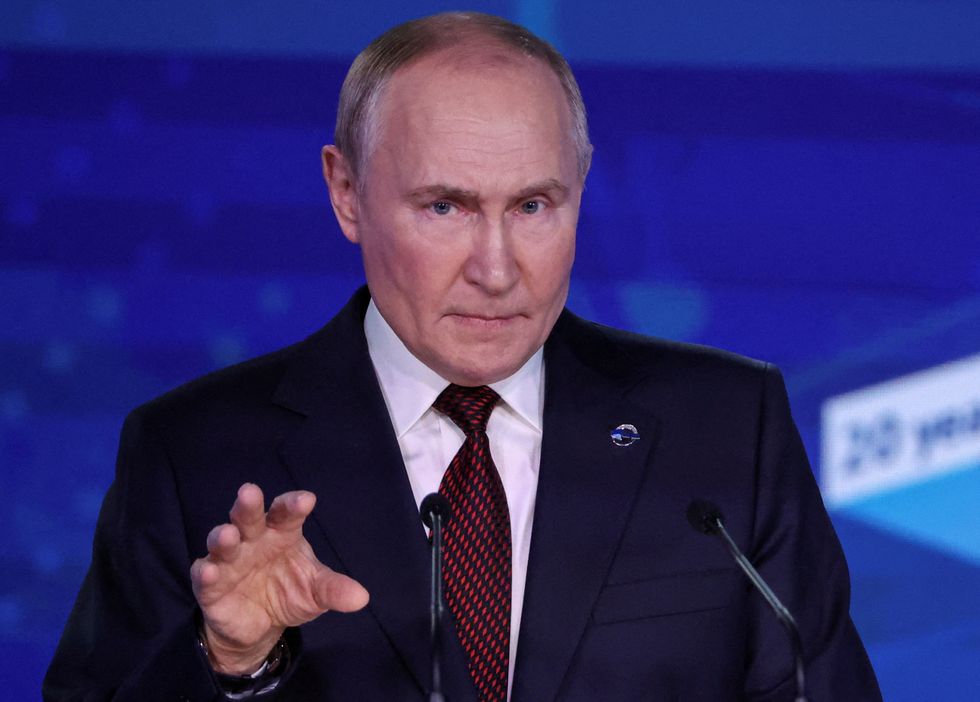Has Joe Biden just started WW3? What the approval of long-range missiles means for Ukraine and the world

For all its flaws, X does provide a temperature gauge on how polarised the world is.
President Joe Biden’s decision to give Ukraine the green light to use US-supplied long-range missiles on Russian soil is further evidence of this fracturing, with emotions ranging from expressive joy to existential dread.
French philosopher described the go-ahead as “historic”, adding: “As for me, I am moved to tears with gratitude. For #Ukraine, for their friends, for all those who have witnessed the suffering and struggle of the #Ukrainians, this is an immense emotion.”
Other high-profile figures condemned the move as recklessly provocative, with Trump’s eldest son, Donald Trump Jr, warning that Biden risks starting World War three.
He tweeted: “The military industrial complex seems to want to make sure they get World War 3 going before my father has a chance to create peace and save lives. Gotta lock in those $Trillions. Life be damned!!! Imbeciles!”
So, which is it? Firstly, let’s look at Biden’s reasons for granting Ukraine’s use of long-range missiles in Russia.
The White House is keen to stress that the escalation is a response to escalation.
The deployment of thousands of North Korean troops to support Russian military efforts in the Kursk region along Ukraine’s northern border has intensified the conflict, the Biden administration says.
Ukrainian President Volodymyr Zelensky has long argued that refusing to permit Ukraine to strike targets deep inside Russia was hampering its ability to defend itself against Russian attacks, particularly those targeting civilian infrastructure like energy grids.
This argument became unassailable on Sunday when Russia unleashed its largest air strike on Ukraine in almost three months, pounding the country’s power grid as winter approaches.
Many analysts interpret the move as a last-minute dash to secure Ukraine’s position before the change in US leadership.
The fear – and a legitimate one – is that the incoming president will be seduced by the “America First” wing of his party and pull the plug on funding for Ukraine.
Biden might be looking to cement his legacy, calculating that a big bold move could boost morale on the battlefield and force Putin into negotiations.
Or as George Barros, a lead analyst at the Institute for the Study of War, put it: “I think Biden and his advisors are trying to essentially do what they can do while they still hold the reins of power in government, before they give it back to president-elect Trump in January.”

How much damage will the weapons do?
The ground-launched Army Tactical Missile System, more commonly known as ATACMS, have been used by Ukraine to strike Russian military targets in occupied Ukrainian territory for more than a year.
The weapons were used to devastating effect in Crimea last October, destroying nine helicopters in two strikes.
But the weapons were never granted for use inside Russia – until now.
Produced by US global security and aerospace company Lockheed Martin, the missiles carry a 500lb (227kg) class blast fragmentation warhead.
The missiles can reach up to 186 miles (300km) and are difficult to intercept due to their high speed.
The weapons are fitted with a specialised GPS and carry cluster munitions.
When fired, the clusters open in the air, releasing hundreds of bomblets rather than a single warhead.
How effective these weapons will prove on the battlefield depends on what Ukraine is trying to achieve by using them.
It’s more likely to strike a psychological blow over a physical one, although that will not be negligible either.
A war correspondent reporting on the ground in Ukraine regards the move as a “big shift”.
Dylan Burn wrote on X: “It gives Ukraine the ability to hit troops buildups deeper in Russia before they reach the frontline, can hit more ammunition storage before they can be fired at Ukraine, and could give them more leverage going forward.”
However, he and other military analysts have pointed out that supply shortages will hobble Ukraine’s ability to hit Russia where it hurts.
Analyst Brad Bowman cited these logistical challenges in an interview with NPR last month.
“The US really can’t send a lot more without hurting its own military readiness,” he said.
The big question now is: will the UK follow suit with the Storm Shadow long-range missiles it supplies to Ukraine?
The UK Government has been reluctant to give Ukraine permission without a shift in US policy, in part because the missiles use American navigation data.
Will Russia now go to war with the West?
The White House has been worried about escalation with Russia ever since it invaded its neighbour two and half years ago.
And there’s always a concern that Putin could hit the nuclear button.
Russian officials have previously warned that such actions could be interpreted as NATO’s direct participation in the war and that it’s willing to use nuclear weapons if provoked.
In September, Putin discussed changes to Russia’s nuclear doctrine, which reflect an evolution in the conditions under which Russia might employ nuclear weapons.
Worryingly, he lowered the threshold to include potential responses to an attack that poses a critical threat to the sovereignty of Russia, carried out by a nonnuclear power with the participation or support of a nuclear power.
“Aggression against Russia by any nonnuclear state, but with the support of a nuclear state, is proposed to be considered as their joint attack on Russia,” he said during a televised meeting of Russia’s Security Council.
It’s worth remembering that Putin has used such bombastic language before but not delivered on these threats.
For example, the provision of tanks, jets, and other advanced systems to Ukraine during the 1000-day war has not resulted in Russia attacking NATO countries directly.
This suggests that Russian threats might be more about deterrence or posturing than actual intent to take the fight to NATO.
LATEST MEMBERSHIP DEVELOPMENTS
- Britain is about to pay a price for David Lammy’s ‘infantile’ comments about Trump
- ‘You’ll have to start again!’ Expat in France warns Britons
- Britain must reject slavery reparations for three reasons – William Clouston

The biggest unknown is what this decision means for Trump’s foreign policy agenda.
Trump himself has not yet commented but he has promised to end the war in Ukraine in “24 hours” and several of his allies have expressed anger about the move.
Congresswoman Marjorie Taylor Greene wrote on X: “The American people gave a mandate on Nov 5th against these exact America last decisions and do NOT want to fund or fight foreign wars. We want to fix our own problems.”
Utah Senator Mike Lee wrote on X that “Libs love war” and “War facilitates bigger government”.
X owner Elon Musk, soon to be head of the “Department of Government Efficiency” (DOGE) alongside Vivek Ramaswamy, has echoed these views.
He has questioned the wisdom of sending US aid to Ukraine, especially in light of domestic issues, such as the southern border.

